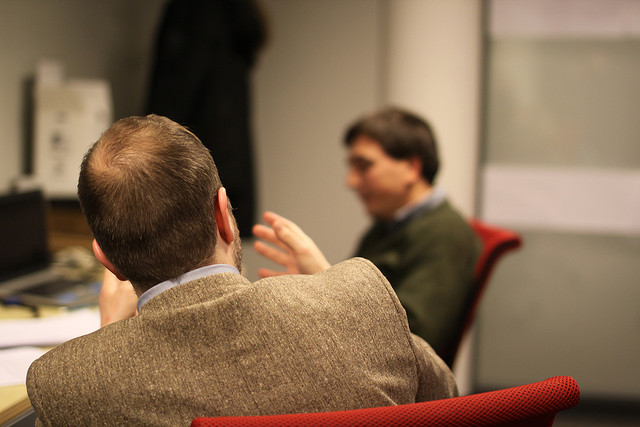Being part of a deliberative process can change citizen views and build legitimacy, but the key to impact comes from the public themselves
We know that deliberative dialogue processes can have valuable impacts on policy making, but what impact do they have on the citizens who take part? This is the question that Tim Hughes and Amy Pollard of Involve set out to explore itheir new thought leadership piece, Changing Hats, published this month for Sciencewise. They argue that the process affects those involved in different, but usually positive, ways.

How does engagement with deliberative processes change participants? (Credit: Gwenael Piaser, CC BY NC SA 2.0)
Deliberative theory has emphasised the ability of citizens to take on information and approach issues rationally and with greater regard for others when in a deliberative setting. In theory, people will become more ‘pro-social’ when supported to explore issues in dialogue with others – becoming more aware of others’ perspectives and thinking about problems from a more collective, rather than individual point of view. But does this really happen in practice?
We wanted to take an evidence based approach, and examine what the practical experience of dialogue reveals about how the impact on participants. When people are asked to wear ‘a different hat’ as they deliberate – as a citizen, consumer, resident, tax-payer, parent, student, pensioner, patient, etc – what hat do they actually wear? And what impact, if any, does this have on their attitudes longer term?
Reviewing the evidence we found that participants’ opinions can change as a result of deliberation, but that this is more likely on issues that a participant has not already considered, and is likely to be due to internal deliberation as much as deliberation with others. Where opinions have already been formed – particularly on value-laden issues – individuals can be prone to fit the available evidence to their views, rather than change the views themselves. This presents an interesting challenge for experts (who, after all, are citizens too), who will by definition be approaching dialogue with pre-formed views, and may have to make particular effort to be open-minded and reflexive about the benefits deliberation can bring to their own thinking.
It’s a particularly interesting finding for me, as I settle into my new job as dialogue manager at Sciencewise – a programme funded by the Department of Business, Innovation and Skills to support policymakers to engage the public on issues relating to science and technology. I had always felt it was slightly arbitrary that we were only providing support on issues relating to science and technology. Surely there are a whole range of other policy issues where the public voice is key. But if participants in dialogue are more likely to have a bias towards their pre-existing views on topics they have already explored before, then focusing on science and technology issues makes sense. Science and technology is, by its very nature, exploring new ground and bringing up new issues through innovation and discovery. Perhaps more than any other field, it’s an arena where the public are most likely to be exploring new issues, learning new things and be relatively unencumbered by preconceived ideas. Arguably science and technology is therefore an arena where public dialogue will be particularly likely to add value.
Whether the nature of participants opinions change or remain stable, the evidence suggests that being part of deliberation is likely to strengthen the attachment that individuals’ have to those views. This often means that the perspectives are taken more seriously by others. An important impact of deliberation is therefore not solely in the extent to which participants learn new things and potentially change their views, but the way that it can deepen the legitimacy of public positions. This is likely to be particularly valuable where there is doubt over whether the public is appropriately informed when expressing their views – again, an issue which emerges regularly in the highly technical arenas of science and technology.
True to the theory, there are several examples of where deliberation leads to greater empathy among citizens, with more ‘pro-social’ outcomes and participants becoming more considerate of others’ needs through the dialogue process. However, this is not true of every context, and it should not be assumed to always be a good thing – as there can be concerns with bias or with dialogue generating an ‘artificial consensus’, which does not endure once the dialogue process has been disbanded.
Bias is of course an enduring concern for participative dialogue – as it is with any form of social enquiry. But the evidence is that high quality deliberative dialogue can overcome, at least in part, the challenges of cognitive bias. By creating a forum of open discussion; providing balanced information; forging a common objective; and critically, bringing together a diverse and balanced group of participants, dialogue can be a means to address and correct biases that may be present in other methods for exploring public views. Interestingly, the key factor for effectively ensuring that issues of bias are addressed (or minimised) is to maintain a reflexive, self-critical stance and to avoid complacency that is issue is ‘dealt with’. From this perspective it may be that, counter-intuitively, the participative dialogue processes which are most explicit about issues of bias are the ones that are most likely to be valid.
There are no hard and fast rules about how being part of a deliberative process will impact on citizens. It is often an opportunity to learn, to reflect, to engage and to change – and participants may find the experience transformative whether or not their own views shift during the process. Those commissioning and designing deliberative processes have enormous influence on whether the processes are good quality, legitimate and robust, and have particular responsibility to address issues of bias. But perhaps the most exciting thing about dialogue is that the nature of its impact on citizens depends, above all, on citizens themselves.
—
Note: this post represents the views of the author and not those of Democratic Audit. Please read our comments policy before posting. The shortened URL for this post is: https://buff.ly/1gHv96N
—-
Dr Amy Pollard is Deputy Director of Involve. A full biography can be found on Involve’s website.






 Democratic Audit's core funding is provided by the Joseph Rowntree Charitable Trust. Additional funding is provided by the London School of Economics.
Democratic Audit's core funding is provided by the Joseph Rowntree Charitable Trust. Additional funding is provided by the London School of Economics.
Being part of a deliberative process can change citizen views and build legitimacy https://t.co/1YI7xfAJ2J
@floppy @shawncgeorge Just read this, it’s relevant to the citizen panel/jury stuff in Rebooting Democracy: https://t.co/EbKIr5E47P
Being part of a deliberative process can change citizen views and build legitimacy, but the key to impact comes … https://t.co/SSH0fYLdct
#deliberation & #politicaldialogue is necessary, as is political #maturity. #politics #society #elections #behavior
https://t.co/HNYCVArXyn
Being part of a deliberative process can change citizen views and build legitimacy, but the key to impact comes… https://t.co/0ItahKMlR8